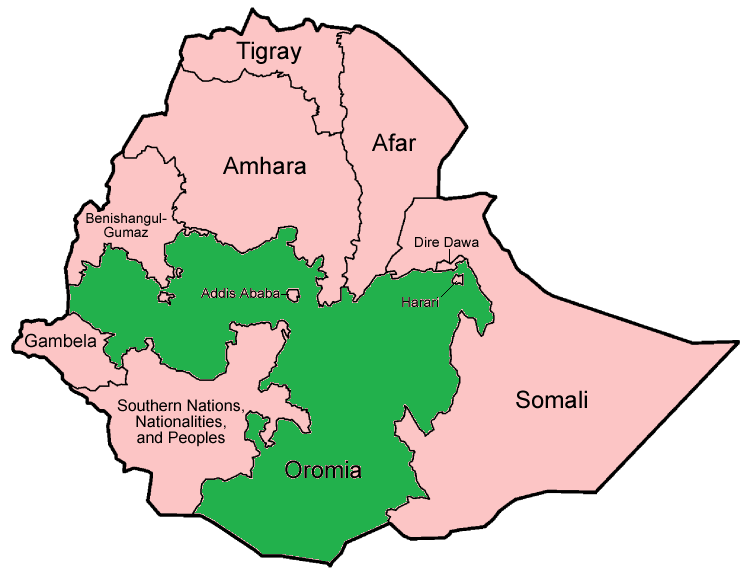Why in news?
Over 80 people have been killed in clashes with security forces in Ethiopia following the murder of popular singer Hachalu Hundessa.
What happened?
- The musician was shot by unidentified assailants in the Galan Condominium area of capital city Addis Ababa.
- The motive for the murder remains unclear.
- The local police has arrested some individuals in connection with the case.
- A Human Rights Watch report stated the government cut internet services across the country, in response.
- This made it difficult to access information on those who were killed and injured in the protests.
What was the recent controversy?
- Just before his death, on June 22, 2020, Hundessa gave an interview to the Oromia Media Network (OMN).
- This had sparked outrage on social media.
- During the interview, he criticised the government.
- He spoke out against the marginalisation faced by his community, the Oromos.
- Following his death, OMN was raided by the police and several journalists were detained.
- Jawar Mohammed, who owns the network, was also taken into custody.
Who are the Oromos?
- The Oromo community is the largest ethno-linguistic group of Ethiopia.
- It makes up more than 50% of the country’s population.
- They speak a language of the Cushitic branch of the Afro-Asiatic family.
- There are thousands of Oromo people living in diaspora, largely residing in the U.S., Australia, Canada, Norway, England and Sweden.

Who is Hachalu Hundessa?
- Hundessa, 34, was a musician and activist.
- Born into the Oromo community, he sang about their struggle for freedom.
- Hundessa started writing songs when he was imprisoned for political activities between 2003 and 2008.
- There are not many artists in East Africa who get to witness their own stellar achievement in their lifetime. But Hachalu Hundessa did.
How significant was Hundessa?
- Hundessa was the undisputed king of contemporary Oromo music of resistance (also known as Geerarsa).
- He used his artistic tools to engage in the most profound reflections on issues of identity, dispossession, precarity, marginalisation and love.
- His songs encapsulate some of the most complex, subtle and painful narrations about the reality of the Oromo experience.
- These include the political repression, the cultural subordination, and the economic deprivation the Oromo have been suffering for decades.
- Many within his Oromo community saw him as indispensable to their struggle for political emancipation.
- He gave voice to the anti-government protests that emerged in 2014.
- This culminated in the resignation of prime minister Hailemariam Desalegn in 2018.
- Desalegn was succeeded by Abiy Ahmed to become the first prime minister from the Oromo community.
- Ahmed won the Nobel peace prize in 2019 for his efforts towards resolving the border dispute with neighbouring Eritrea.
When did tensions begin?
- The protests began in 2014 after the government announced a plan to expand the boundaries of the capital into the Oromia region.
- The community was concerned that the expansion would displace farmers living in the outskirts.
- The plan, called the “Addis Ababa Master Plan”, was eventually dropped.
- However, the protests continued.
- This signalled the growing frustration of the ethnic group facing marginalisation.
- Separately, anti-government protests also emerged in the Amhara region.
- This is home to another ethnic community called the Amharas.
- Tensions in Oromia and Amhara escalated after October 2, 2016.
- That was when, during the Oromo thanksgiving holiday, over 55 people were killed in a stampede.
- After fresh protests broke out following the incident, the government declared a state of emergency.
- It established a special unit to “rehabilitate” those who had been arrested for participating in violence or unrest in the past year.
- According to Amnesty International, following the events of October 2016, the government security forces arrested tens of thousands of people.
- These include arrests in Amhara and Oromia among other regions.
- Those arrested included political activists, protesters, journalists and members of the Human Rights Council among others.
What are the recent human rights violations?
- Various reforms led to the release of thousands of detainees following Ahmed’s prime ministership.
- However, a recent Amnesty report claims that Ethiopian security forces have committed “grave” violations between December 2018 and December 2019.
- Since March 2019, security officers have forcefully evicted over 60 families from Oromia’s East and West Guji zones.
- The report adds that in order to mobilise support ahead of the now postponed elections, politicians have been trying to stir up ethnic and religious animosities.
- They have sparked inter-communal violence and armed attacks in five of the country’s nine regional states.
- Amidst this, Hundessa's tragic death is an incalculable loss as he inspired a whole generation of Oromos to fight for their rights.
Source: Indian Express
